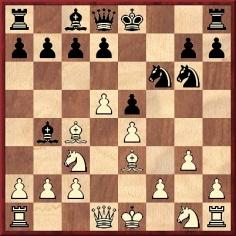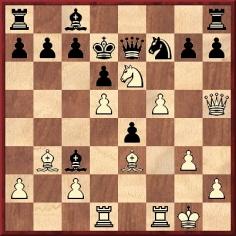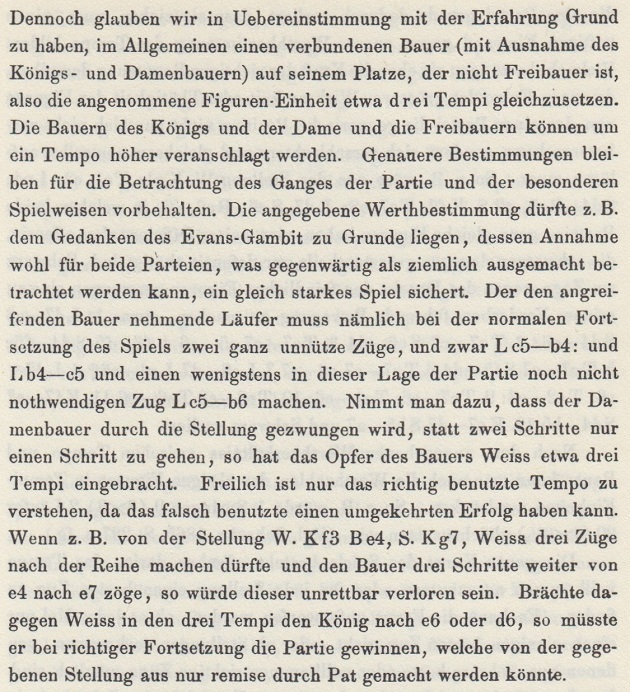
Edward Winter
From The Soul of Chess:
The Tarrasch quote ‘Tempo is the soul of chess’ was given on page 387 of Kings, Commoners and Chess from page 56 of Tarrasch’s Schachzeitung, 15 November 1933. The original German:
‘Wie ich schon öfters erklärt habe: das Tempo ist die Seele des Schachspiels.’
Concerning the Earliest Occurrences of Chess Terms, Volfango Rizzi (Chester, England) suggests an entry for ‘tempo’.
The following appeared as a note to White’s 8th move in ‘a fine contest played at Kling’s Chess Rooms, between two strong players’ on page 36 of The New Chess Player, 28 August 1852:
‘Black, by sacrificing Pawn, gains a tempo, bringing all his pieces into action.’
The game’s other two notes also mixed up White and Black, and the score itself was garbled. A correct version is given below:
Players and occasion?1 e4 … 2 d4 Nc6 3 Be3 e5 4 Bc4 Nf6 5 d5 Ne7 6 Nc3 Ng6 7 g3 Bb4

8 Ne2 Nxe4 9 O-O Nxc3 10 bxc3 Ba5 11 f4 e4 12 f5 Ne5 13 Bb3 d6 14 Nd4 Bxc3 15 Qh5+ Nf7 16 Ne6 Qe7 17 Rad1 Kd7

18 f6 Bxf6 19 Ba4+ c6 20 dxc6+ bxc6 21 Bxc6+ Kxc6 22 Qd5+ Kd7 23 Qb5+ Kxe6 24 Qf5 mate.
The word ‘tempo’ in its chess sense does not currently appear in the Oxford English Dictionary. It is not the easiest term to explain concisely, and we wonder whether any reader can propose a better definition than B.H. Wood’s on page 115 of Easy Guide to Chess (Sutton Coldfield, 1942):
‘A move, or turn to play, considered as a unit of time. Thus “to lose a tempo” is to make a useless move.’
(5852)
Wanted: early sightings of the rule-of-thumb suggestion about the material value of three tempi. Examples from the 1930s:
‘Ebenso kann man einen Bauern gleich drei Tempi schätzen.’ Page 311 of Das Schachspiel (Berlin, 1931). From page 219 of The Game of Chess (London, 1935): ‘A pawn can be valued at three tempi.’
‘Wir wissen, daß in offener Stellung drei Tempi ungefähr einen Bauer ersetzen.’ Page 45 of Richtig Opfern! (Leipzig, 1935). From page 93 of The Art of Sacrifice in Chess (London, 1935): ‘We know that in an open position three tempi are approximately equal to a pawn.’ From page 85 of the Reinfeld/Horowitz revision (New York, 1951) of J. du Mont’s translation: ‘We know that in open positions, three tempi are approximately worth a pawn.’ Although the volume by Reinfeld and Horowitz was an extensive rewrite, it was used in the ‘21st Century Edition’ (Milford, 2015) without any mention of them.
(10751)
Regarding suggestions that the value of a pawn may be three tempi, Thomas Niessen (Aachen, Germany) draws attention to the following, on page 137 of the Deutsche Schachzeitung, May 1866:

This comes from an article entitled ‘Synthetische Grundlage zur Theorie des Schach’ by Eugen von Schmidt.
(10778)
To the Chess Notes main page.
To the Archives for other feature articles.
Copyright: Edward Winter. All rights reserved.